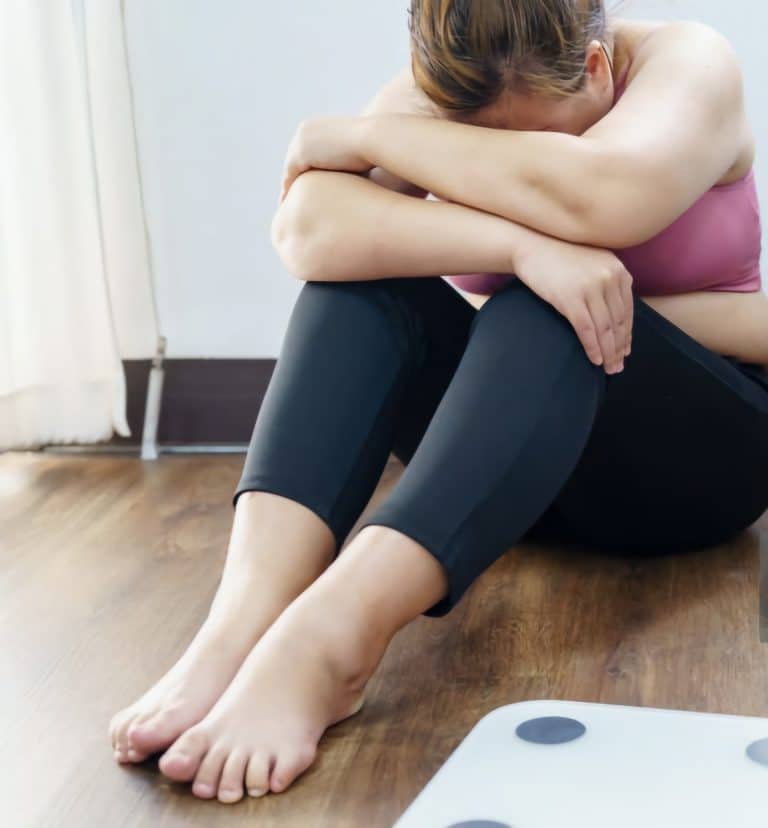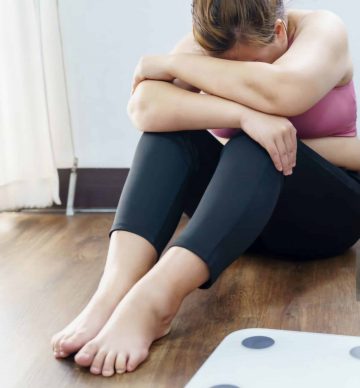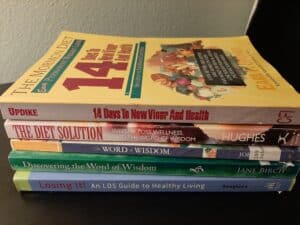This is the first in a series of guest posts about being fat and female in The Church of Jesus Christ of Latter-day Saints. Please consider contributing your own post by emailing [email protected].
When puberty hit, it hit hard. I can’t recall ever shopping for a B-cup bra. It seems that one night I went to bed a scrawny little girl and woke up a curvy young woman the next day. I’m quite sure the transformation didn’t literally happen overnight, but all these years later this is how I think about my experience.
With my new curves came new rules; like longer hemlines on skirts or shorts and higher necklines to hide burgeoning breasts. The messaging behind these new rules was loud and clear: the female body must be covered to make it less noticeable to males. Covering my body did not help. I heard plenty of inappropriate comments about the size of my breasts, and I was slapped on the behind while drinking from the junior high water fountain. And while I don’t remember the specifics of those modesty lessons in young women’s group, the message that female bodies were simply too irresistible for the male gender was being reinforced by the actions of some of them. Unfortunately, I can’t recollect one woman in my life suggesting that perhaps males should be held accountable for their behavior.
I’m uncertain whether my weight gain arose from my subconscious desire to hide a body that drew unwanted attention, or whether it was genetics. There’s a solid argument for both theories, and either way the result was the same. By the time I went to high school, I had heard the word fat applied to my body. While unwanted attention from boys tapered off as my weight crept up, girls willingly stepped in to fill the gap and comment on my size or clothing choices. I distinctly remember the day a modesty lesson was presented in seminary, and as we walked across the street to the school, a classmate turned to me and said, “You know you’re breaking the rules of modesty.” Looking down at my jeans and navy cable knit sweater, I analyzed the neck line with confusion. Not even my collarbones were visible. I was wearing pretty much the same item that dozens of girls in the group were wearing, why was she singling me out? I didn’t have to wait long for my question to be answered, “With your chest, you shouldn’t wear clothing that tight.” The words still sting today.
This message and many others I received around females bodies remained consistent as I went off to college. I attended institute classes and young adult firesides regularly where I continued to hear the same modesty messages I’d heard in my youth. In fact, they seemed to intensify. Now that I was of marriageable age, the stakes were higher and the hormones even more intense during the courtship phase of dating. Females needed to be even more careful how they presented themselves and how they used their body. The trouble was, by this time, when they were talking about how tempting the female form was, I was certain nobody was talking about MY body.
Mixed in with all the messages surrounding females staying covered for the sake of men, were the messages about making certain female bodies were attractive to them. I heard on more than one occasion the joke that Mormon men should strive for excellence on their mission because the more faithfully they served, the hotter their wife would be. As my friends started to marry, I was questioned about my dating status at their weddings and bridal showers. When I reported I wasn’t in a serious relationship, I was met with either condescending sympathy or unsolicited advice about improving myself in order to be more attractive to the opposite sex. More often than not, this advice included something about weight loss. I listened to female friends share similar incidents and heard stories about being counseled by leadership to shed some pounds in the interest of finding a mate. Perhaps most notable was the gut-wrenching experience of one dear friend whose break up with her returned-missionary boyfriend was the result of him telling her, “I would marry you if you could just lose a few pounds.” I have never been more proud of anyone than I am of her as she responded, “Easy, I figure by breaking up with you I’m losing more than 150!”
Even when the messages weren’t clearly directed at me, I internalized them and the shame increased. I recall a bulletin board in the institute building where the staff would pose a question for the students to respond. One particular week, the question read something along the lines of, “What’s your favorite thing about winter?” In letters large enough to draw attention were the words, “No fat chicks in shorts.” If I doubted the disdain for my body before, in that moment I was absolutely certain of it as my face flushed and I held back tears. I didn’t know who wrote it, but I was certain it applied to me. His message was loud and clear; I needed to cover my body again, but this time for a completely different reason.
A year out of college, I was enjoying my new career and had shed several pounds. I started dating the brother of a friend and he seemed to love and accept me for who I was. Yet, during our engagement, when I knew he would inevitably see me naked, I felt compelled to explain in detail my flaws: the stretch marks on my breasts from the rapid onset of puberty and weight gain, the less-than-toned stomach, the cellulite on the thighs. I didn’t believe him on our honeymoon when he held me and told me how beautiful I was. I still struggle to believe him now. The messages I have internalized around female bodies are more powerful than the affirmations of one dear, kind man.
In thirty-four years of marriage, I have still never heard my husband say a disparaging comment about my body, or any other female for that matter. Unfortunately, I cannot say that every member of his family refrains from talking negatively about people’s size. It didn’t take long until his family’s references to weight and body size became so unbearable to me that my husband had to inform his parents we would not attend any family functions if that subject continued to be discussed. Prior to establishing that boundary, the most egregious offense I remember was the night my father-in-law joked about his wife of 30-plus years, the mother of his 5 children, weighing 20 pounds more than the day he married her. He seemed to think he was particularly clever, when he declared with a smirk, “That’s 20 pounds I’m not sealed to!” To this day, I regret that my shock left me unable to speak out in that moment. I wish I would have defended my mother-in-law (and every other woman in the room) by countering with, “That’s 20 pounds of her that won’t need to put up with you in the hereafter!”
Recently I stumbled across a song called “Fat” by an artist named Kate Yeager. I’ve listened to it many times over, and I often find myself singing the profound words of the chorus:
Didn’t know how to hate myself,
’til I learned it from someone else.
Didn’t see what was wrong with me,
Just lived in my body
Did my best to lose the weight,
Hoping the hurt would go away,
But damn skinny feels just the same,
I’ll always carry it in my body
Through the years, regardless of my weight, I’ve carried the emotional scars inflicted on me by the church’s teachings about the female body. I had to cover my body when it was too attractive and I had to cover it when it wasn’t attractive enough. I recognize that the pervasiveness of the patriarchy means that all women, regardless of their religious background, are conditioned in a similar fashion. I find it particularly troubling that the place I learned to hate my body was the place I was taught I held truth and peace. The same place where I was taught not to question the patriarchy. What is even more tragic is that as a youth, toxic teachings stole my ability to simply exist in my body, and it is something that I’ve never fully recovered.
Guest author Millicent Collins is an Arizona native with two degrees, a passion for learning, and a new-found desire to write her stories. She is a teacher, wife, mother, mother-in-law, and grandmother.






7 Responses
Thank you for sharing your story! You do a fabulous job of pointing out the awful flaws in our culture while sharing how it’s made you feel over the years. So much to think about in your piece. Thank you!
Thank you for sharing your story. It highlights so well the ways our culture too often objectifies women and reduces women to bodies that must be monitored and critiqued. Not to mention the harm of such rhetoric on women’s psyches. Your piece is making me think of all the damaging rhetoric about women’s bodies that I too have internalized over the years.
One LDS guy once told me that the reason Mormon men seek a “perfect” female body is that they don’t get to sleep around like other guys. They get to experience B breasts, DDD breasts and all types of bodies. But because they are only getting one wife for eternity (or a few more if she kicks it first), they want the best they can get. It infuriated me at the time and it infuriates me now. Stop looking at us as bags of skin and see us all as the goddesses that we are.
I remember when I finally realized that it wasn’t just “the world” that was obsessed with women’s looks. The church has far narrower beauty standards than most fashion magazines! They try to tell you that the same God that made your body doesn’t really like bodies that look like yours.
Maggie, you are correct that Mormons have tighter beauty standards than most nonmembers. I remember being in Germany with the military and how you kind of look for other Americans, because English. Maybe it is the only time that I really looked at people and how they dressed, but yes, Americans have an American look. I found I could pick out the Mormons easily among the Americans because they look like BYU coeds, then you confirm their Mormonness by looking for garment lines. And at church back in the states in the “mission field, I could tell the women who were BYU graduates from those who were not. They had fancier hair, more makeup, and showed off their figure more, not with skin, but with tight fitting clothing. It was quite eye opening to see the recognizable BYU cookie cutter look. Although I grew up in Provo, so I REALLY knew the BYU coed look, I tossed my grant money for BYU and paid full price and living away from home costs to avoid going to BYU. After life in Provo, I knew I couldn’t stomach that kind of conformity. There really is pressure on Mormon women to look modest but supper sexy, in the skinny model way. The women have to compensate for lack of skin showing with tighter clothing, better figures, bigger more styled hair and more make up than average American women.
Thank you for sharing this. I’ve gone back and read it a few times and tried to sort through the feelings it elicited. I can’t really separate “the church” from “society” in terms of how I feel about my body. I do remember in high school bemoaning I was fat. (I was not, by any reasonable standard. I’ve found pictures of my high school self and she was muscular and in shape.) Now as an adult, when by any medical standard I am fat, I’m in this weird place of trying to be OK with my body and trying to not be fat–in some cases for good reasons, like running–I love running, and it’s harder on my joints to carry a bigger body around. But also because some part of me knows fat=bad. It’s not the right part of me, it’s not the part I want running the show, it’s not even something I actively believe. But the voice is there.
One thing I do remember being in church in my body was the realization that I was not pretty. None of the boys wanted to date me. They never asked me to dance at church dances; I was always doing the asking. There was no worry about dating before I was 16 or breaking the law of chastity; those opportunities just didn’t arise. I hated feeling ugly. I hate now that I allowed other people’s opinions of me to define how I felt about myself, but I did. And now, 25 years years later, through college and grad school and a lengthy and good career, when I am middle-aged–it hasn’t really gotten easier. I hardly dated in college. I wasn’t even flirted with. When I moved to Utah after college, when I was literally surrounded by single Mormon men, I only had a few dates spread out over 8 years. I had no success on the apps, even as I heard people talking about how easy it was for women to get dates on there. And in a church that screams “marriage!” my lack of it has driven home the reality that I am not pretty, that I am not thin, that I am not physically desirable to men. I’m single now not because I’ve rejected lots of men in favor of my career or because I’m too picky or because I aim to be a childless cat lady (I do! I do! Except for me it’s a childless dog lady.), it’s because in my life, only one man was ever interested enough and, well, I guess I was too picky that time. And I have no regrets. I don’t actually have any regrets about being a childless dog lady either; my life has turned out pretty great and I aim to keep it that way. But it can be hard to look at myself and know that I am not attractive, and wondering how it would be different to be thin and/or to be pretty.
I know this got a little dark and I’m not looking for sympathy, I promise. But I think, considering how women are consistently told that our worth lies in being a wife and a mother and the ability to do that lies in finding a man and not being able to do that can result in just seeing everything that is wrong with you. There’s a whole host of other issues for women who have to be attractive enough to keep their husbands (ugh, throwing up in my mouth) or returning to pre-pregnancy weights and just all that other stuff. I get that it’s all of society, not just the church. But it shouldn’t be in the church of Jesus Christ AT ALL. If we’re going to argue that we are led by Jesus Christ, there shouldn’t be a whiff of devaluing women because of their bodies or objectifying women’s bodies.
Thank you so much for this post.